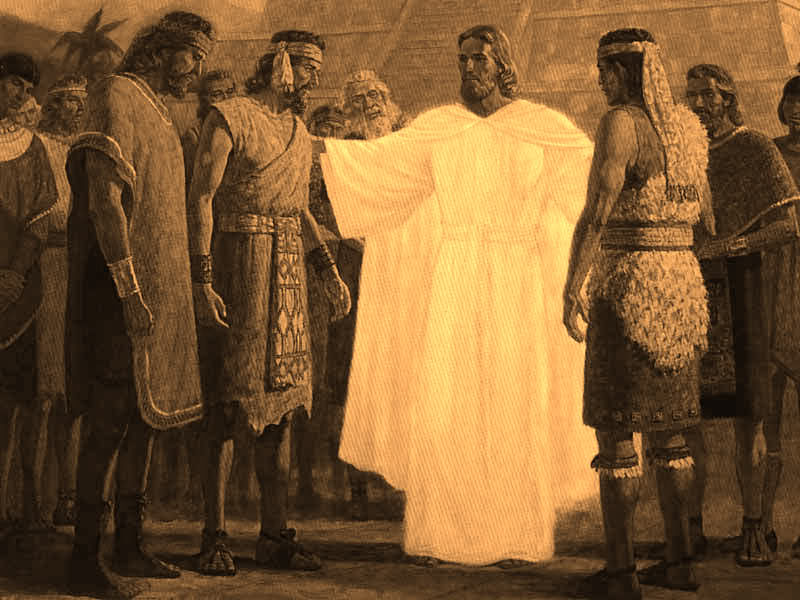Question
Dear Gramps
Why is Jesus Christ spoken of in the Book of Mormon as early as 559 BC?
Brenda
Answer
Dear Brenda,
You are probably referring to the use of the term, Jesus Christ, which is the English translation of the Greek translation of the name that was given to the Savior at his advent into mortality.
The Savior happens to be the God of the Old Testament, so he was known by the Nephites in the Promised land as well as by the Israelites and the Jews in the Old World. In the English versions of the Old Testament, the word LORD (all capitals) is frequently used as a translation of the word, Jehovah. The word Lord, with only the first letter capitalized, is a title of respect common in the English language. Examples in the Old Testament are the following:
And Moses said unto the LORD, O my Lord, I am not eloquent, neither heretofore, nor since thou hast spoken unto thy servant: but I am slow of speech, and of a slow tongue.(Ex 4:10)
And they said, The LORD commanded my lord to give the land for an inheritance by lot to the children of Israel: and my lord was commanded by the LORD to give the inheritance of Zelophehad our brother unto his daughters. (Numbers 36:2)
Other references include Josh 3:13; Judges 6:13; 1 Sam 25:26; 2 Sam 4:8; 1 Kgs 1:36; Ps 8:9.
The Christian world generally believe that Jehovah is the name of God, the Father. That this is not so is clearly demonstrated by the words of the LORD in Ex 6:2-3–
And God spake unto Moses, and said unto him, I am the LORD:
And I appeared unto Abraham, unto Isaac, and unto Jacob, by the name of God Almighty, but by my name JEHOVAH was I not known to them.
So Jehovah represented himself to the ancients only as God, whom they took to be God, the Father. But in Exodus the LORD clarifies that it has not been God, the Father, or in his terminology, “God Almighty,” but rather Jehovah, who is the Son of the Father, representing the Father to His children on earth.
Now we must show that Jehovah is actually Jesus Christ. This is also clear from the Old Testament. In Zech 12:8-9 it is shown that the LORD, or Jehovah, is speaking. The continuation of the passage in verse 10 identifies the LORD, or Jehovah, as the Son of God who suffered for the sins of man, and who identifies himself as “his only son” (in the flesh) and as “his firstborn” (in the spirit), clearly the Savior, Jesus Christ.
8 In that day shall the LORD defend the inhabitants of Jerusalem; and he that is feeble among them at that day shall be as David; and the house of David shall be as God, as the angel of the LORD before them.
9 And it shall come to pass in that day, that I will seek to destroy all the nations that come against Jerusalem.
10 And I will pour upon the house of David, and upon the inhabitants of Jerusalem, the spirit of grace and of supplications: and they shall look upon me whom they have pierced, and they shall mourn for him, as one mourneth for his only son, and shall be in bitterness for him, as one that is in bitterness for his firstborn.
It is clear in this passage that Jehovah is speaking of himself as he who would appear in mortality as the Son of God to atone for the sins of mankind. Now to the use of the English language name, Jesus Christ, that we also find in the Book of Mormon.
Jesus was born among those who spoke Aramaic, and the name given to him in that tongue was Jeshua, which would be Joshua in Hebrew. That name is based on the Hebrew verb for “save” and means “Jehovah is salvation.” The Greek equivalent is transliterated as “Jesus.” So, had our English bible been translated from the Hebrew rather than from the Greek, the Savior would have been known to us as Joshua the Messiah rather than Jesus the Christ.
But the question (finally) is how did the name Jesus Christ appear in the Book of Mormon, which was written by a group of Israelites who separated themselves from the main body of the House of Israel in 600 BC, migrated to the New World, and lived there in isolation from the rest of the world for 1000 years.
The first time the name of the Savior is used in the Book of Mormon is in 2 Ne 25:19,
For according to the words of the prophets, the Messiah cometh in six hundred years from the time that my father left Jerusalem; and according to the words of the prophets, and also the word of the angel of God, his name shall be Jesus Christ, the Son of God.
In chapter 25 of 2 Nephi, Nephi prophesies of the restoration of the gospel in the last days, and identifies the Messiah “who cometh in six hundred years from the time that my father left Jerusalem.” He further states that an angel revealed to him that “his name shall be Jesus Christ, the Son of God.”
Nephi, of course, did not speak English; he spoke Hebrew. But he did not write his record in the Hebrew language ; he wrote in Egyptian.
Among the plates containing the record of the Book of Mormon that were delivered to Joseph Smith by the Angel Moroni, were the Small Plates of Nephi, from which this passage is taken–the very handwriting of Nephi, rather than the abridgement of Mormon made 1000 years later. So the hieroglyph in question that Joseph Smith saw was the Egyptian term for the Aramaic Jeshua.
The Prophet Joseph translated that word into its English equivalent–Jesus Christ–a most logical, and indeed, the only correct way that it could have been done.
Gramps







